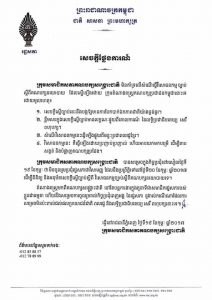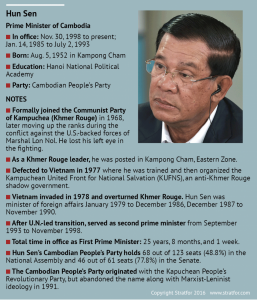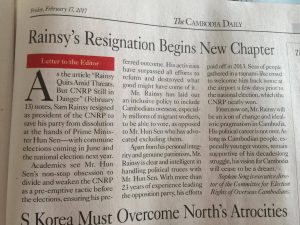Australia silent as Cambodia’s Hun Sen deals final blow to democracy
Comment: 22 February 2017
Op-Ed: TheAge.Com
Prime Minister Hun Sen has remained in power beyond the time of any of the world’s democratic leaders through use of politically motivated violence, control of security forces and the courts, and massive corruption.
Still to this day, I am haunted by the image of a pretty young girl sitting in shock amid the blood and debris of a grenade attack on an anti-government rally in a park across from the Royal Palace on March 30, 1997, in which 16 people were killed and 120 injured.
Bangkok: Twenty per cent of Cambodians live in poverty. Forty-two per cent of children under five years old are malnourished and stunted. More than half of Cambodians lack access to toilets and sanitation.
For three decades Hun Sen has ruled Cambodia with the tacit backing of foreign countries sympathetic to the leader of a nation emerging from genocide and civil war.

Australia has long being at the forefront of a donor-nation generosity that has seen billions of dollars pour in to help Cambodia’s 16 million people.
Since 2014 in particular Australia has showered diplomatic praise and an additional $40 million on Hun Sen and his ministers in return for Cambodia accepting what has turned out to be only a handful of refugees from Nauru.

Canberra is sending $90 million of taxpayers’ money to the country this financial year alone to contribute to what the Department of Foreign Affairs claims will be the country’s “greater prosperity”.
But the reality is very different.
Prime Minister Hun Sen has remained in power beyond the time of any of the world’s democratic leaders through use of politically motivated violence, control of security forces and the courts, and massive corruption.
Still to this day, I am haunted by the image of a pretty young girl sitting in shock amid the blood and debris of a grenade attack on an anti-government rally in a park across from the Royal Palace on March 30, 1997, in which 16 people were killed and 120 injured.

The girl was smiling, unaware of the calamity around her.
I looked down and saw she had no legs. She died on the way to hospital.
The level of corruption in the country that Australia’s Coalition government has made one of its closet allies in Asia – for political gain at home – is staggering.



